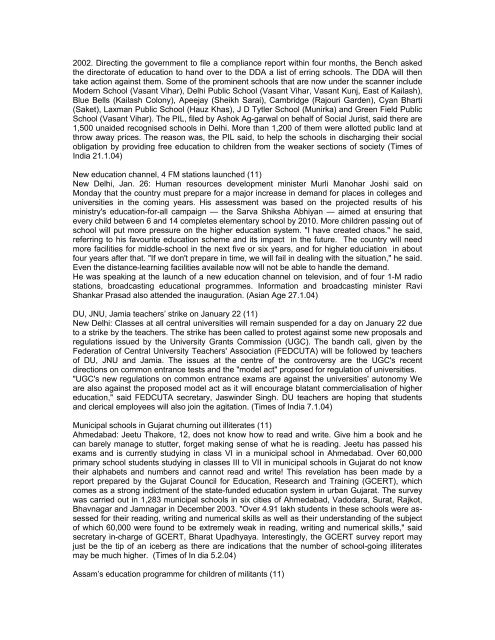EDUCATION - 2004 - Indian Social Institute
EDUCATION - 2004 - Indian Social Institute
EDUCATION - 2004 - Indian Social Institute
You also want an ePaper? Increase the reach of your titles
YUMPU automatically turns print PDFs into web optimized ePapers that Google loves.
2002. Directing the government to file a compliance report within four months, the Bench asked<br />
the directorate of education to hand over to the DDA a list of erring schools. The DDA will then<br />
take action against them. Some of the prominent schools that are now under the scanner include<br />
Modern School (Vasant Vihar), Delhi Public School (Vasant Vihar, Vasant Kunj, East of Kailash),<br />
Blue Bells (Kailash Colony), Apeejay (Sheikh Sarai), Cambridge (Rajouri Garden), Cyan Bharti<br />
(Saket), Laxman Public School (Hauz Khas), J D Tytler School (Munirka) and Green Field Public<br />
School (Vasant Vihar). The PIL, filed by Ashok Ag-garwal on behalf of <strong>Social</strong> Jurist, said there are<br />
1,500 unaided recognised schools in Delhi. More than 1,200 of them were allotted public land at<br />
throw away prices. The reason was, the PIL said, to help the schools in discharging their social<br />
obligation by providing free education to children from the weaker sections of society (Times of<br />
India 21.1.04)<br />
New education channel, 4 FM stations launched (11)<br />
New Delhi, Jan. 26: Human resources development minister Murli Manohar Joshi said on<br />
Monday that the country must prepare for a major increase in demand for places in colleges and<br />
universities in the coming years. His assessment was based on the projected results of his<br />
ministry's education-for-all campaign — the Sarva Shiksha Abhiyan — aimed at ensuring that<br />
every child between 6 and 14 completes elementary school by 2010. More children passing out of<br />
school will put more pressure on the higher education system. "I have created chaos." he said,<br />
referring to his favourite education scheme and its impact in the future. The country will need<br />
more facilities for middle-school in the next five or six years, and for higher educiation in about<br />
four years after that. "If we don't prepare in time, we will fail in dealing with the situation," he said.<br />
Even the distance-learning facilities available now will not be able to handle the demand.<br />
He was speaking at the launch of a new education channel on television, and of four 1-M radio<br />
stations, broadcasting educational programmes. Information and broadcasting minister Ravi<br />
Shankar Prasad also attended the inauguration. (Asian Age 27.1.04)<br />
DU, JNU, Jamia teachers’ strike on January 22 (11)<br />
New Delhi: Classes at all central universities will remain suspended for a day on January 22 due<br />
to a strike by the teachers. The strike has been called to protest against some new proposals and<br />
regulations issued by the University Grants Commission (UGC). The bandh call, given by the<br />
Federation of Central University Teachers' Association (FEDCUTA) will be followed by teachers<br />
of DU, JNU and Jamia. The issues at the centre of the controversy are the UGC's recent<br />
directions on common entrance tests and the "model act" proposed for regulation of universities.<br />
"UGC's new regulations on common entrance exams are against the universities' autonomy We<br />
are also against the proposed model act as it will encourage blatant commercialisation of higher<br />
education," said FEDCUTA secretary, Jaswinder Singh. DU teachers are hoping that students<br />
and clerical employees will also join the agitation. (Times of India 7.1.04)<br />
Municipal schools in Gujarat churning out illiterates (11)<br />
Ahmedabad: Jeetu Thakore, 12, does not know how to read and write. Give him a book and he<br />
can barely manage to stutter, forget making sense of what he is reading. Jeetu has passed his<br />
exams and is currently studying in class VI in a municipal school in Ahmedabad. Over 60,000<br />
primary school students studying in classes III to VII in municipal schools in Gujarat do not know<br />
their alphabets and numbers and cannot read and write! This revelation has been made by a<br />
report prepared by the Gujarat Council for Education, Research and Training (GCERT), which<br />
comes as a strong indictment of the state-funded education system in urban Gujarat. The survey<br />
was carried out in 1,283 municipal schools in six cities of Ahmedabad, Vadodara, Surat, Rajkot,<br />
Bhavnagar and Jamnagar in December 2003. "Over 4.91 lakh students in these schools were assessed<br />
for their reading, writing and numerical skills as well as their understanding of the subject<br />
of which 60,000 were found to be extremely weak in reading, writing and numerical skills," said<br />
secretary in-charge of GCERT, Bharat Upadhyaya. Interestingly, the GCERT survey report may<br />
just be the tip of an iceberg as there are indications that the number of school-going illiterates<br />
may be much higher. (Times of In dia 5.2.04)<br />
Assam’s education programme for children of militants (11)

















